Meet Ron L. Dowell | Author/activist
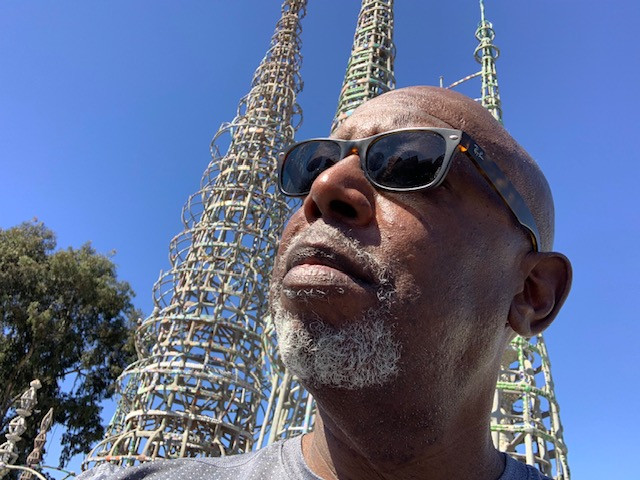
We had the good fortune of connecting with Ron L. Dowell and we’ve shared our conversation below.
Hi Ron L., what was your thought process behind starting your own business?
I have an undergraduate business degree in accounting from CSUDH. I passed the Uniform Certified Public Accountant Examination in the mid-80s. At the time, I worked in public service as a program auditor and wanted to mesh the best of public and private business approaches while preparing to leave public service for the private sector. Working for the public sector was viewed by the private sector as a disadvantage during the 80s. I was never employed by private, public accounting firms that could offer the experience I needed. I experimented with private sector business strategies while working for L.A. County healthcare and later public safety (law enforcement), such as performance measurement, specific goal attainment, best practices, and team building successfully. I developed a passion for process improvements using business solutions in the public sector. That passion I coupled with my love for writing when in 2010 I converted a Master’s Degree thesis into a published book: Compton4COPS: Community-Based Crime Fighting in Disadvantaged Racially and Ethnically Diverse Urban Communities. But, over two decades earlier, I’d started my own tax preparation business, RonDowCo. Since COPS was self-published, I decided to connect my poetry and fiction writing to another company and formed Deniggerlator Publishing. Like my earlier experiences with trying to transition to the private sector, I knew the road would be difficult, and there are not a lot of Black faces in the literary world, especially males. I also know that much of my personal experience and history is being erased and that there are not many narratives that tell my story, having been born and raised in Los Angeles. For example, I lived in public housing in my early years, first in Jordan Downs and later in Palm Lane. Although it was built shortly after World War II until it was razed in 1968-71 to make Dr. Martin Luther King Jr. General Hospital, there’s not much history about Palm Lane. Over two hundred households lived in a nexus of single-story, flat-roofed fourplex apartments splayed across 26 acres, a county strip between Watts and the city of Compton: a sort of neutral zone between disparate communities, like an O ring used to seal opposing surfaces against high pressure.
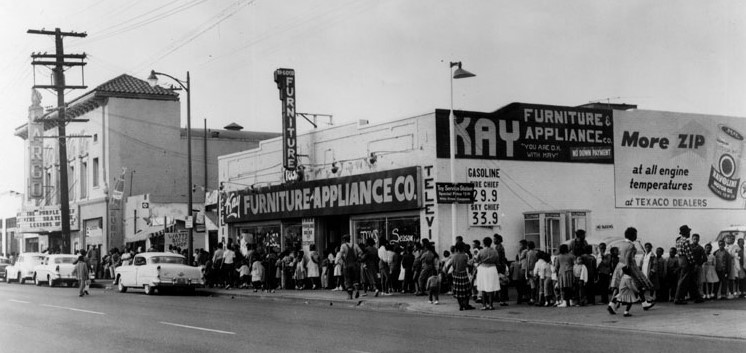
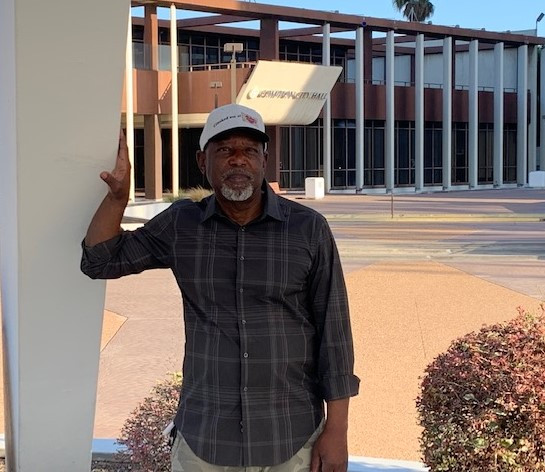
Let’s talk shop? Tell us more about your career, what can you share with our community?
My business is my writing; writing is my business, both literally and figuratively. I combined both passions and wrote Watts UpRise, my poetry collection, and Crooked out of Compton, an upcoming short fiction collection. Having retired from L.A. County after 40 years as a public servant, half healthcare and half in public safety (law enforcement), I’ll always serve the public. I feel obligated to give back to my community, particularly to the Watts and Compton areas where I grew up. I do for others what many have done for me. I’m excited about an opportunity to connect gritty stories showing how people find hope and even joy in lives where basic needs are hard to meet. My poetry and stories talk about a suite of sociopolitical realities in an honest, innovative way—a way that challenges stereotypes and humanizes people. I’m proud that Watts UpRise was a Press 53 finalist, that my poem Compton, an energy-fueled dark star, is a Pushcart Prize nominee, and that World Stage Press liked the collection enough to publish it. I’m pleased that Crooked Out of Compton was a semi-finalist for the Chestnutt Review Stubborn Artists Contest and a finalist for the Black Lawrence Press 2020 Big Moose Prize. My short story “Don’t Worry” was a finalist in the 2021 Prime Number Magazine Award for Short Fiction. “Bruised” is a Tulip Tree Merit Prize winner.
I cleaned up in my drug dependence in the early 20s and found myself working as an alcohol and other drug program planner for what was then called the Southeast Healthcare Region (Watts, Compton, South Central). My job was to write the county plan for “treatment services.” I had to research to write the proposal and convince the head office to fund local recovery programs. The job enabled me to travel all over L.A. County.
It was clear that the area with the most drug problems was my area. It soon became apparent that bureaucrats would divvy up the money uniformly throughout the county no matter how much data I presented or how creatively I wrote the plan. In other words, areas with far fewer problems received the same money as the Southeast Region, sometimes less. However, even though I didn’t see it at the time, those years of writing service plans were my best introduction to creative writing.
The only thing easy for me was playing baseball, as I describe in my poem, “Anger Management in a Time of COVID-19 Pandemic and Riotous Grief,”
“First, understand what you call “a riot,”
was the Watts rebellion ending our 1965
Little League season. No last-inning strikeout
but choking smoke, thick of burning rubber.
No walk-off home run, but smoldering wood.
No game-winning catch, but chemicals scorching
our throats, chest, lungs, interrupting me & Gerald’s
sunrise to sundown baseball passion on Gopher
Hole Stadium, redlined with public dollars. No—…”
1965 left a hole in my baseball trophy collection. I started playing the game around 1960 when I was about nine. I have won team trophies from 1963, 64, 66, and 67. Unfortunately, the so-called Watts Riot ended our 1965 season prematurely. Police ignited the uprising when they bashed in a drunken Marquette Frye’s black head in racially segregated Watts. Thirty-four people died, and ambulances transported hundreds more to emergency rooms many miles away. Playgrounds closed, trash piled up when sanitation workers refused to pick it up, and thousands of National Guard troops were added to the police already in Watts.
I’ve learned to love myself, and I understand that I cannot possibly love others until I do. I share this reveal almost sanctimoniously in my poem “What I Learned from a Bell Pepper,”
“I’ve turned inside out, stood unclothed
and often unlearned misteaching
by circles of the dead. To learn
we penetrate the skin, substrate,
don’t settle for first impressions.
Listening is the first thing to do.
Too many times, I’ve heard you speak
and I wanted you to finish
so I could make my point. You’d ask
what I understood you to say
and I’d stand there scratching my head
disappeared like the Hoodoo
man rootwork. Feedback lets
others know we listened. Burdens
lift, community blossoms, shift
when we listen to each other
and if to you they won’t listen…”
My secondary schooling was not the best, and I was not always the best student, especially after elementary school. School, particularly for Black boys, sucked. Few of us seemed encouraged to take education seriously, to use the library, to seek anything other than a manual labor “job.” I’m proud that despite my “D” GPA out of Centennial High in Compton, I bore migraines and turned it around during my second stint at Compton College in 1971. I’m okay with being the first college graduate in my family several times. I’m good with helping to mitigate the erasure of a Black male’s experience growing up in South Central Los Angeles. I’m okay growing up with Black Panther and Black Muslim influences.
I knew before he did what Nipsey Hussle meant “…Dedication, hard work plus patience/The sum of all my sacrifice, I’m done waitin’/I’m done waitin’, told you that I wasn’t playin’/Now you hear what I been sayin’/dedication/It’s dedication…”
I added the element of risk and visited a similar theme in my poetry piece, “Breaking Point,”
“For days we’ve flown in tight formation
…I break rank and stiffen
will others follow? I’m never alone
without the constant song of our quarrel
without crumbs and worms from our hunters
without the comfort of our flock. What lies
outside us torments my familiar.
Songbirds that stray don’t return to chirp
of separation’s claim, what it means
to left turn, right, when flight direction points south.
I blink slowly on changing winds. When my
eyes reopen, I’m ocean-bound—”
Few knew about the tons of hours I spent in libraries all over the Los Angeles area learning new and unlearning what’s useless in my workplace experiences and in my art. I’ll never give up serving my community, although I may have to change direction as I have so many times.
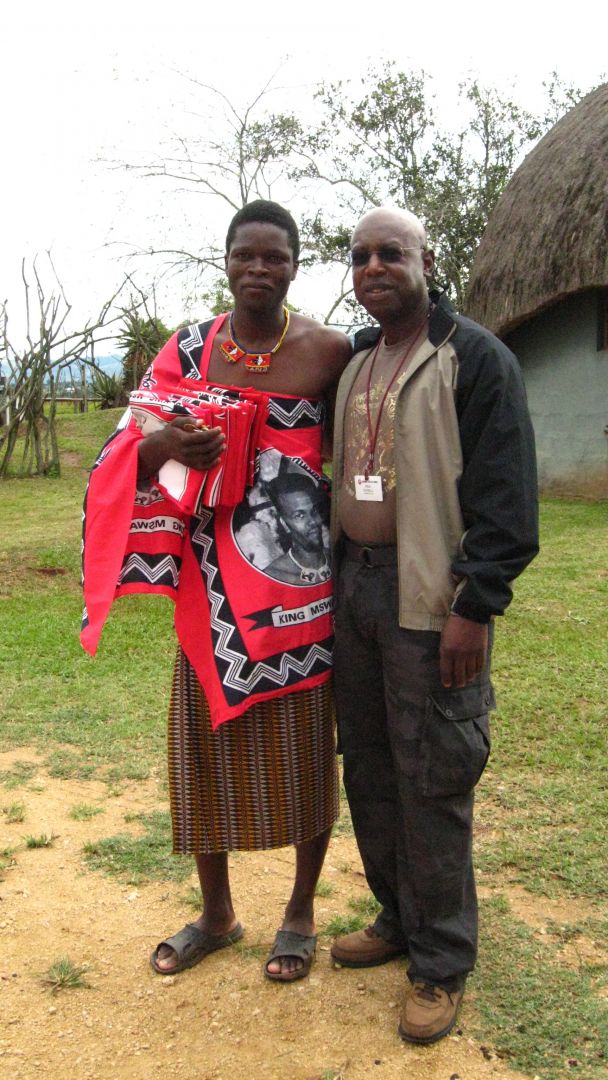
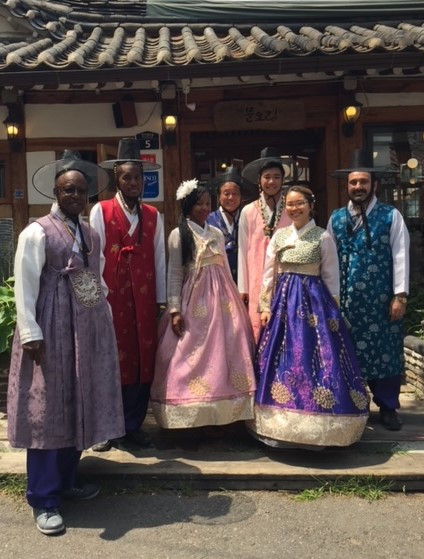
If you had a friend visiting you, what are some of the local spots you’d want to take them around to?
Mention “California,” and most people think of sun-kissed beaches, star-studded glamour, Hollywood success, or the Silicon Valley. Mention Watts and most think of so-called “riots.” “Compton” makes some think of gangs, gangsta rap, and crime. However, my art expands the narrative to include stories that reveal a different facet of the South [Central] Los Angeles community and its inhabitants. I’ve taken folks from out of state to Compton. They always want to visit the “action.” We might visit “Patricia Coffee,” “Angeles Abby,” or “New Earth Health Foods.” Next, they always ask, “When do we get to Compton?” We pass the King Memorial near Compton’s city hall on our way to the Watts Towers. When they inevitably want the picture, I say, “We’ve been in Compton all along.” On our way to the Watts Towers, we’ll pass “Planet Health Compton,” “Compton Creek,” and “Jackie Robinson baseball fields that are currently under redevelopment by Clayton Kershaw. Depending on how much I like my visitor best friend, we might visit the skatepark in Leuder’s Park, Willowbrook [now Ceasar Chavez] my elementary school, Willowbrook Junior High, Centennial High, or if I’m in a good mood, we will stop by rival Compton High, which is under full reconstruction. Maybe, just maybe, we’d stand at Compton’s crossroads, Willowbrook Avenue and Compton Blvd. From that vantage point, one can see the real Compton populated by everyday people just trying to make it. Real people represent 95% of Compton. If they are not at work, I will make sure my friend meets my cousins, in-laws, and children living in Compton. I’d introduce my friend to Isaac Asberry, CEO of the Teen Intervention Program, and, if in session, we’d log in to the Concerned Citizens of Compton Zoom meeting. Admittedly, I’d only offer a glimpse of hood-family graffiti. I’d avoid the plethora of smoke shops and illegal weed dispensaries. I’d also avoid Tam’s Burgers at Compton and Rosecrans Blvd. and the courthouse skyscraper, an effigy that was blown up in during the halftime Superbowl LVI.
I’d treat my best friend to the Watts Towers. The Watts Towers are folk art/assemblage, a collection of seventeen sculptures built by Simon Rodia over 34 years. Since I’ve met her, I’d introduce my friend to Rosie Lee Hooks, Watts Towers Arts Center Campus Director. We’d visit my old home, Building #33 in Jordan Downs Public Housing. My friend would have to see the resurrected Dr. MLK General Hospital, and I’d tell them how I was born in Big County General Hospital over 20 miles away before King was built. My mom had to endure labor pains and extended time to make that journey as “Big G” was the only emergency hospital around.
We’d walk through Leimert Park and Degnan Avenue, the location of bookstores and art galleries. We’d hit any good live theatre shows and, of course, dine at Simply Wholesome. We’d see Nipsey Hussle’s place and other shops and eateries along Crenshaw Blvd. On the way to Hollywood, we stop by the oversized blue Scientology L.A. Org to pick up some self-help material. We’d tour Hollywood and Sunset Blvd, careful to avoid the unhoused encampments. We’d loop west down Sunset to the end, head south, Dockweiler Beach, and then east back to the CPT. After my introductory tour, I’d ask my friend what they wanted to see/do.
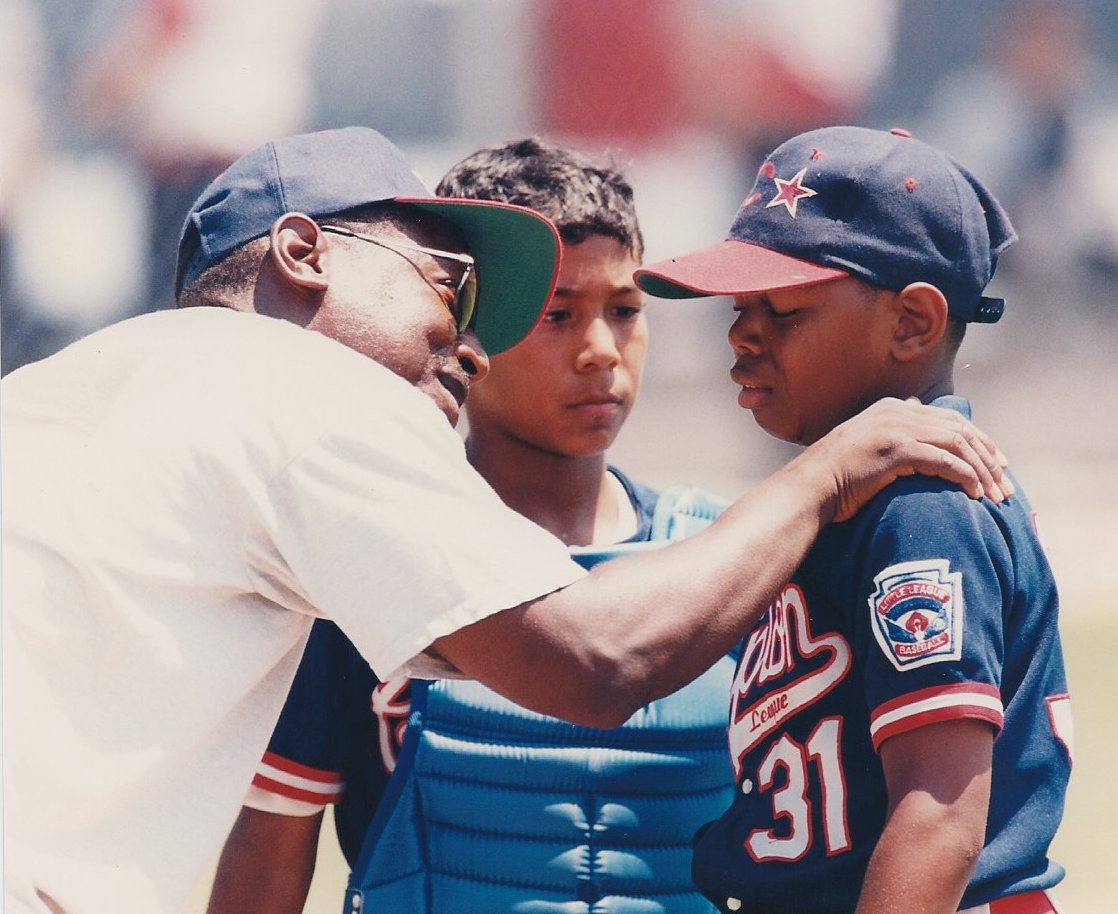
The Shoutout series is all about recognizing that our success and where we are in life is at least somewhat thanks to the efforts, support, mentorship, love and encouragement of others. So is there someone that you want to dedicate your shoutout to?
In 2010 I published Compton4COPS: Community-Based Crime Fighting in Disadvantaged Racially and Ethnically Diverse Urban Communities. Since I worked in upper management for the Los Angeles County Sheriff’s Department, I was familiar with their operations. I knew LASD would never provide the quality of service needed for Compton. Nor would they ever take the time and make an effort to figure it out. Theirs is a one-size-fits-all antiquated service approach, a skeleton key used on an electric door. I believed I could encourage Compton residents to take more control of the city’s public safety. Minimally, I hoped to start a community conversation about policing and public safety, if nothing else. The results are mixed. Police have pretty much controlled the narrative since their start as slave patrols. It’s challenging for Compton residents to envision or consider other public safety options. When we do, we’ll set the world on fire. We will. Nevertheless, I thank former sheriff Leroy Baca for offering his employees an educational opportunity through CSULB. I took full advantage and obtained two Master’s Degrees in Criminal Justice and Emergency Services Administration.
On July 9, 2022, at the Sims Library of Poetry, World Stage Press will launch my poetry collection Watts UpRise. I feel incredibly fortunate to have run into Hiram Sims and the Community Literature Initiative (CLI) at the start of the COVD-19 pandemic, where I was part of both the 2020 and 2021 cohorts. I’d first taken poetry classes in the UCLA Extension Writers Program, but I sharpened skills learned there in CLI.
In 2022 or early 2023, Running Wild Press’s RIZE imprint will publish my short story collection titled Crooked out of Compton.
About 12 years ago, I stumbled across a means of serving my community and preserving some history: fiction writing and poetry. The UCLA Extension Writing Program taught me how to write creatively. I met mentors as a 2018 PEN America Emerging Voices Fellow, such as author Tananarive Due; my association with UCLA professors Lou Matthews, Collete Sartor, Paul Mandelbaum, Laurel Ann Bogen, and Suzanne Lummis has enabled me to write the two books mentioned above.
I can’t leave out my workshop groups: AC Bilbrew Writers Group, The Saturday Morning Literary Group, and Tertulia Literary Salon. Those groups give me a platform and invaluable feedback.
Once I retired from L.A. County in 2008, I continued to serve my community by working with several nonprofits that worked with young people, Compton Baseball Academy Teams, Teen Intervention Program, Sports Spectacular.
In my early 20s, I took drawing classes at Compton College. By that time, I worked as a Community Worker for L.A. County Mental Health. Co-workers offered to buy my drawings. I thought they were sympathetic and maybe empathetic toward me as the low-man-on-the-totem-pole in an otherwise college degree and professional setting. I gravitated toward a psychiatric nurse at Southeast Mental Health named Sechon, who was intensely interested in all things spiritual and artistic. Under his mentorship, I learned to silversmith Native American jewelry since it was far less expensive to make than buy. He taught me the basics of photography. Years later, I started a videography business because people seemed willing to pay me for what I’d otherwise do for free. I love taking pictures and have traveled the world doing so.
I feel obligated to give back what I’d received from Sechon, Fay Wilson, David Edmond, and so many others who, with their love and support, helped save me from myself. I overcame pill addiction while working in mental health in the early 70s. Right after the Watts Uprising, our streets flooded with all sorts of drugs: Lilly Pharmaceutical bullet-head F40s, Quaaludes, everything from acid to cocaine to weed to heroin was readily available to me and somewhat affordable through a series of escalating petty criminal activities.
Helping folk one-on-one is okay as it follows the mental health model, but I wanted to reach more people. I needed to share how reading the Autobiography of Malcolm X while serving weekend jail time in Biscailuz Center jail in the early 70s helped turn my life around. I didn’t know-how until I began to write poetry and short fiction years later. I’m likely the only sheriff employee that served time in one of its facilities before getting hired by the department in 1991. Hey, they needed my financial skillset badly. Plus, their employee, Patricia Jenkins, held their feet to the fire. Thank you, Pat.
As a kid, I always enjoyed reading D.C. comics, Mad Magazines, and the Compton Encyclopedias my mother purchased from the white-haired White man door-to-door salesman for my younger brother and me. Every year he’d bring a book to add to our collection. I thank mom for helping me learn to read and my dad for being the consistent, hard-working role model. Thank God for parking me in the South [Central] Los Angeles Community.
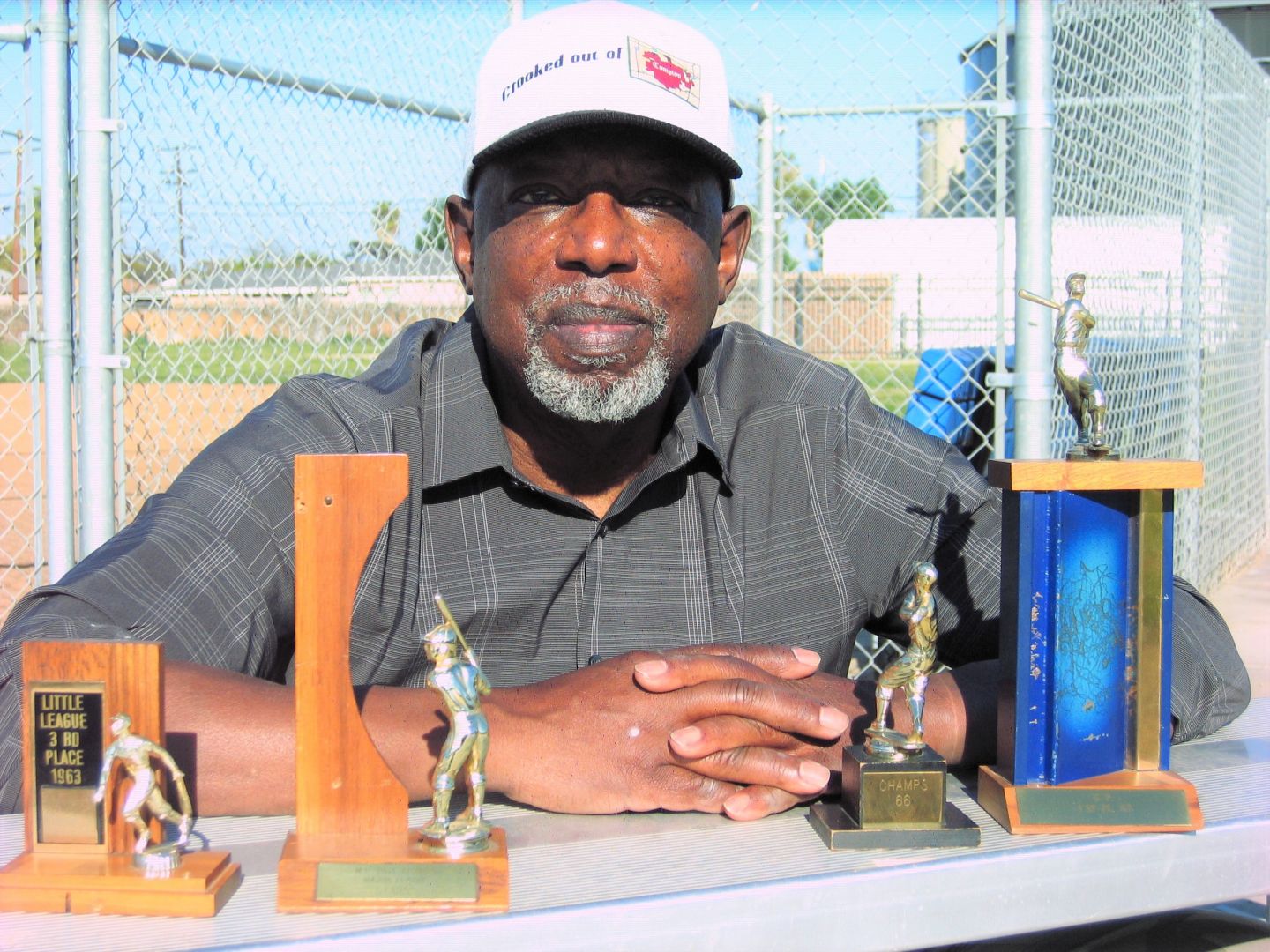
Website: https://crookedoutofcompton.com/
Instagram: @cpt4COPS
Twitter: https://twitter.com/RonDowell4
Facebook: https://www.facebook.com/ron.dowell
Image Credits
All photos by Ron L. Dowell except “Kay Furniture & Appliance,” by Watts Neighborhood Council (Board@WattsNC.org)
